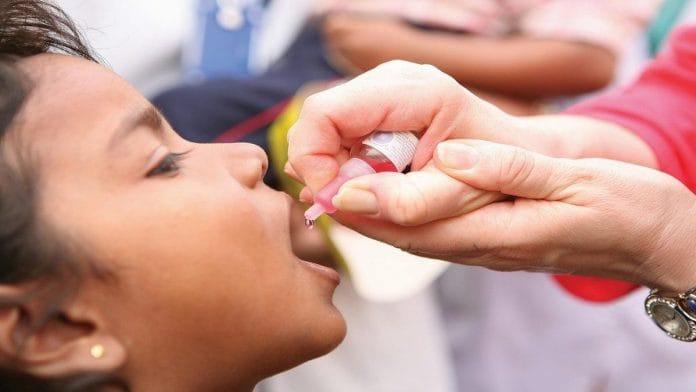New Delhi: Nearly 14.4 lakh children in India did not receive a single shot of any routine vaccine in 2023, with the country recording the second-highest “zero dose” kids, according to a new and significant analysis by the Global Burden of Disease Study Vaccine Coverage Collaborators.
The report—published in The Lancet Wednesday—said that in 2023, more than half of the 1.57 crore unvaccinated children worldwide were living in just eight countries, primarily in sub-Saharan Africa (53 percent) and South Asia (13 percent).
These countries included Nigeria (24.8 lakh), India (14.4 lakh), the Democratic Republic of Congo (8,82,000), Ethiopia (7,82,000), Somalia (7,10,000), Sudan (6,27,000), Indonesia (5,38,000), and Brazil (4,52,000).
The lack of immunisation against deadly diseases puts children at risk of life-threatening diseases, says the World Health Organisation (WHO).
“The challenge now is how to improve vaccine delivery and uptake in areas of low coverage,” said lead author Dr Emily Haeuser.
She added that the world would miss the immunisation goals for 2030 without targeted, equitable immunisation strategies, alongside the strengthening of primary healthcare and efforts to tackle vaccine misinformation and hesitancy.
The World Health Organisation recommends a range of eleven three-vaccine combinations for all children globally, targeting polio, diphtheria, tetanus, pertussis, measles, mumps, rubella, tuberculosis, hepatitis B, Haemophilus influenzae type b (Hib), Streptococcus pneumoniae, rotavirus, varicella, etc.
Vaccine coverage between 1980 and 2023 has globally doubled against diphtheria, tetanus, whooping cough (pertussis), measles, polio, and tuberculosis, according to the report funded by the global vaccine alliance GAVI and The Gates Foundation.
Additionally, the number of children who never received a routine childhood vaccine—known as zero-dose children—declined globally by 75 percent between 1980 and 2019. Their number dropped from 5.68 crore to 1.47 crore just before the COVID-19 pandemic.
But since 2010, progress has stalled or reversed in many countries, with measles vaccination declining in 100 of 204 countries between 2010 and 2019. In 2023, an estimated 1.57 crore million zero-dose children had not received any doses of the diphtheria, tetanus, and pertussis vaccines in their first year of life, the report pointed out.
In India, under the Centre-run Universal Immunisation Programme, vaccines against 12 diseases are offered free of cost to all children, and in some cases, pregnant women at a specified age, via government hospitals.
In a rebuttal to a United Nations Children’s Fund, which had shown a high number of zero-dose children in India last year, the Union health ministry had said the “reports depict an incomplete picture of the country’s immunisation data as they do not factor in the population base and immunisation coverage of the countries compared”.
ThePrint has reached out to Union Health Secretary Punya Salila Srivastava over email for a response to the report. This copy will be updated if and when a reply is received.
Independent experts ThePrint spoke with pointed at the disruption in routine immunisation services during the pandemic across health systems that prioritised COVID-19 care mainly. Traditionally, misinformation and vaccine hesitancy among some population groups have constantly remained barriers.
“The number of zero-dose children has been high in some tribal and other religious minority communities due to a reluctance to accept routine vaccines over the fear of serious side effects,” infectious disease specialist Dr Ishwar Gilada said.
India now needs to prioritise providing vaccination coverage to such groups, Gilada said, adding that it was paramount that people saw these figures in context, such as considering the population of India.
Also Read: Don’t scratch mosquito bites. Here is how to deal with itching, redness
Countries with a huge vaccination gap
India has consistently featured among the countries with the highest numbers of zero-dose children.
According to the report, 53·5 percent of zero-dose children lived in five countries—India, China, Indonesia, Pakistan, and Bangladesh—in 1980.
By 2019, most of them—52.8 percent of zero-dose children—still lived in only seven countries, which are Nigeria, India, Ethiopia, the Democratic Republic of the Congo, Brazil, Somalia, and Pakistan.
The COVID-19 pandemic, which, in many areas, resulted in declining trust in public health institutions and polarised opinions on the necessity, as well as safety, of COVID-19 vaccines, has had varying effects on public perceptions regarding the importance of routine childhood vaccination and willingness to vaccinate, according to the report.
Substantial increases in coverage are necessary in many countries and territories, and those in sub-Saharan Africa and South Asia face the toughest challenges, the report noted.
(Edited by Madhurita Goswami)
Also Read: Eli Lilly announces trial results for world’s 2nd weekly insulin, aims for launch by year-end






